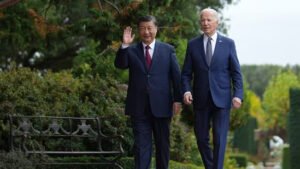![]()
Congress and the Biden-led administration are considering a variety of executive and legislative options to ban TikTok, an intensely popular video-sharing app with nearly 170 American users.
However, the critics argue that the proposed ban could trigger long-term consequences for free speech and expression, global data transfer and mostly importantly US-China ties.
On Wednesday, the US House of Representatives will vote on a bill that was overwhelmingly approved by committee last week. The legislation requires TikTok to cut links with its Chinese owner within 180 days or face a ban in the United States.
While TikTok enjoys word-wide popularity, it has sparked immense concerns among governments about its Chinese ownership and apparent servitude to the Communist Party in Beijing.
Avril Haines, America’s director of national intelligence, has warned the House intelligence committee that China could use TikTok to influence the November elections.
“We cannot rule out the possibility that the CCP (Chinese Communist Party) would use it,” Haines said.
Issuing a major warning to the US government, China on Wednesday claimed that the ban is an attempt to suppress TikTok as the United States has not provided any evidence that app threatens its national security.
In a press conference, the Chinese Foreign Ministry spokesperson, Wang Webin, denounced the US move as “bullying behaviour” that would “inevitably come back to bite the United States itself.”
“Although the United States has never found evidence that TikTok threatens US national security, it has not stopped suppressing TikTok,” said Wenbin.
“This kind of bullying behaviour that cannot win in fair competition disrupts companies’ normal business activity, damages the confidence of international investors in the investment environment, and damages the normal international economic and trade order,” he added.
Meanwhile, TikTok CEO Shou Zi Chew has arrived in Washington in a bid to garner support to stop the bill.
In a letter to bill’s co-sponsors, TikTok’s vice president for public policy Michael Beckerman stated that the proposed legislation poses serious “constitutional concerns”.
“This latest legislation being rushed through at unprecedented speed without even the benefit of a public hearing, poses serious Constitutional concerns,” he wrote in the letter, as per AFP.
A look at Biden and Trump’s take on TikTok ban
US President Joe Biden recently announced that he will sign the legislation, Protecting Americans from Foreign Adversary Controlled Applications Act, requiring Chinese tech giant ByteDance to divest from TikTok.
Addressing reporters at Joint Base Andrews in Maryland’s Prince George’s County, Biden reaffirmed his support for the proposal, saying, “If they [Congress] pass this, I’ll sign it.”
If passed, the legislation would give president the authority to declare other apps as a national security threat if they are controlled by a country considered hostile to the United States.
The revived effort by Washington against TikTok alarmed the firm as TikTok officials were relieved when Biden himself joined the app as part of his re-election campaign.
Former US President Donald Trump, who has long touted his tough stance against China, has reversed his position on the TikTok ban, claiming that youngsters in the United States “would go crazy” without the popular app.
Trump’s U-turn coincides with his meeting with Jeff Yass, a billionaire Republican megadonor who has a significant stake in ByteDance. The meeting has fueled speculations that economic interests are influencing Trump’s stance on the issue.
Trump has even suggested that if the US bans TikTok, companies such as Facebook will gain an unfair advantage. “Without TikTok, you can make Facebook bigger, and I consider Facebook to be an enemy of the people,” he stated in a CNBC interview on Monday.







